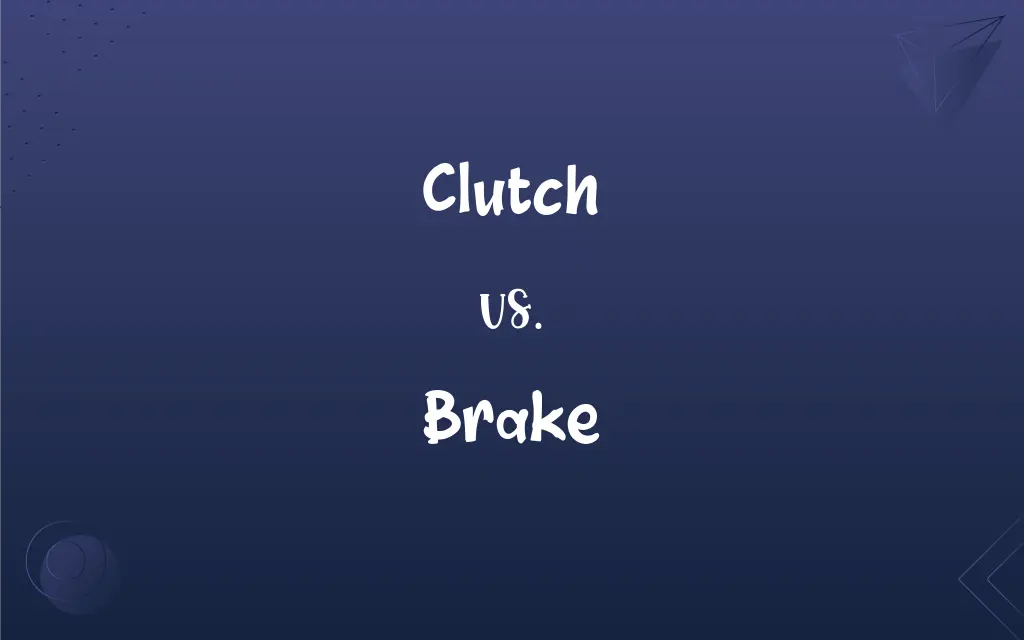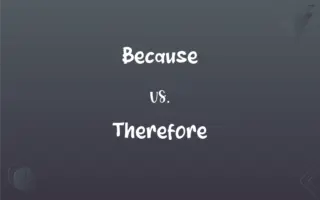Clutch vs. Brake: What's the Difference?
By Janet White || Published on December 15, 2023
The clutch is a mechanism for connecting and disconnecting a vehicle's engine and transmission, while the brake is used to slow down or stop a vehicle.

Key Differences
A clutch is a mechanical device in vehicles that engages and disengages the power transmission from the engine to the drivetrain. A brake, on the other hand, is a device used to apply resistance to the motion of a vehicle, thereby slowing or stopping its movement.
The clutch allows for smooth gear shifting by temporarily disconnecting the engine’s power to the transmission. Brakes are used to reduce a vehicle's speed or bring it to a complete halt, primarily through friction.
In a manual transmission vehicle, the clutch is operated by a pedal. Brakes, whether in manual or automatic vehicles, are activated by a separate pedal.
The clutch plays a crucial role in controlling a vehicle's speed indirectly by managing power transmission. The brake directly controls the vehicle’s speed by providing resistance to the wheels.
Proper use of the clutch ensures smooth driving and gear transitions, while effective use of brakes is essential for safe driving and stopping.
ADVERTISEMENT
Comparison Chart
Primary Function
Connects and disconnects engine power to the transmission
Slows down or stops the vehicle
Operation
Engaged and disengaged by a pedal in manual vehicles
Activated by a brake pedal in all vehicles
Role in Vehicle Control
Manages power transmission for gear shifts
Directly controls speed and stopping
Mechanism
Works through a pressure plate and friction disc
Functions primarily through friction with brake pads
Importance in Driving
Essential for smooth gear transition
Crucial for safe speed control and stopping
ADVERTISEMENT
Clutch and Brake Definitions
Clutch
The clutch plays a key role in power transmission in a vehicle.
A faulty clutch can lead to rough gear transitions.
Brake
Effective use of brakes is crucial for safe driving.
Regular brake checks are important for road safety.
Clutch
A clutch is a mechanism controlling the connection between the transmission and engine.
He pressed the clutch pedal to shift gears smoothly.
Brake
In all vehicles, brakes are activated by a pedal.
She gently pressed the brake pedal to slow down.
Clutch
A clutch is essential for controlling a vehicle’s speed indirectly.
The racer expertly used the clutch to maintain optimal speed.
Brake
A brake is a device used to slow or stop a vehicle.
He hit the brake hard to avoid the obstacle.
Clutch
In manual vehicles, the clutch is operated by the driver’s foot.
Learning to balance the clutch is key to driving a manual car.
Brake
Brakes work by applying friction to the wheels of a vehicle.
The car's brake system was serviced to ensure safety.
Clutch
A clutch allows a vehicle to change gears by disengaging the transmission from the engine.
The driver used the clutch to navigate through different speeds.
Brake
Brakes directly control a vehicle’s speed and stopping.
The driver applied the brake smoothly to stop at the red light.
FAQs
How do brakes function?
Brakes slow or stop a vehicle by applying friction to the wheels.
Is the clutch used in automatic cars?
Automatic cars have an internal clutch, but it's not manually operated like in manual cars.
Can you drive a manual car without a clutch?
It's technically possible but not advisable, as it can damage the transmission.
What happens if the clutch fails?
If the clutch fails, it may be difficult or impossible to change gears.
What are the signs of a failing clutch?
Signs include difficulty in shifting gears, a spongy or loose clutch pedal, and unusual noises when pressing the clutch.
What's a dual-clutch transmission?
A dual-clutch transmission uses two separate clutches for odd and even gear sets.
What does a clutch do in a car?
A clutch connects and disconnects the engine power to the transmission.
Are brakes important for vehicle safety?
Yes, brakes are crucial for vehicle safety.
Do brakes wear out over time?
Yes, brake pads and discs wear out and need to be replaced periodically.
What's the main purpose of car brakes?
The main purpose of car brakes is to ensure safe driving by controlling speed and enabling stopping.
How often should brakes be checked?
Brakes should be checked regularly, typically every 10,000 to 20,000 miles.
Is the clutch pedal the farthest left in manual cars?
Yes, in left-hand drive vehicles, the clutch pedal is typically the farthest left.
Why do clutches wear out?
Clutches wear out due to friction and regular use, especially in stop-and-go traffic.
What's ABS in relation to brakes?
ABS stands for Anti-lock Braking System, which prevents the wheels from locking up during braking.
Is riding the clutch harmful?
Yes, riding the clutch causes excessive wear and can lead to early failure.
Should brakes be soft or firm when pressed?
Brake pedals should feel firm; a soft pedal can indicate a problem.
Is it normal for brakes to squeal?
Some squealing can be normal, but persistent or loud squeals should be checked by a mechanic.
Can worn brakes be dangerous?
Yes, worn brakes can lead to longer stopping distances and potential accidents.
How can I maintain my car’s brakes?
Regular maintenance, including checking brake fluid and pad thickness, helps maintain brakes.
How does engine braking relate to the clutch?
Engine braking involves using the engine and clutch to slow down instead of the brake pedal.
About Author
Written by
Janet WhiteJanet White has been an esteemed writer and blogger for Difference Wiki. Holding a Master's degree in Science and Medical Journalism from the prestigious Boston University, she has consistently demonstrated her expertise and passion for her field. When she's not immersed in her work, Janet relishes her time exercising, delving into a good book, and cherishing moments with friends and family.








































































